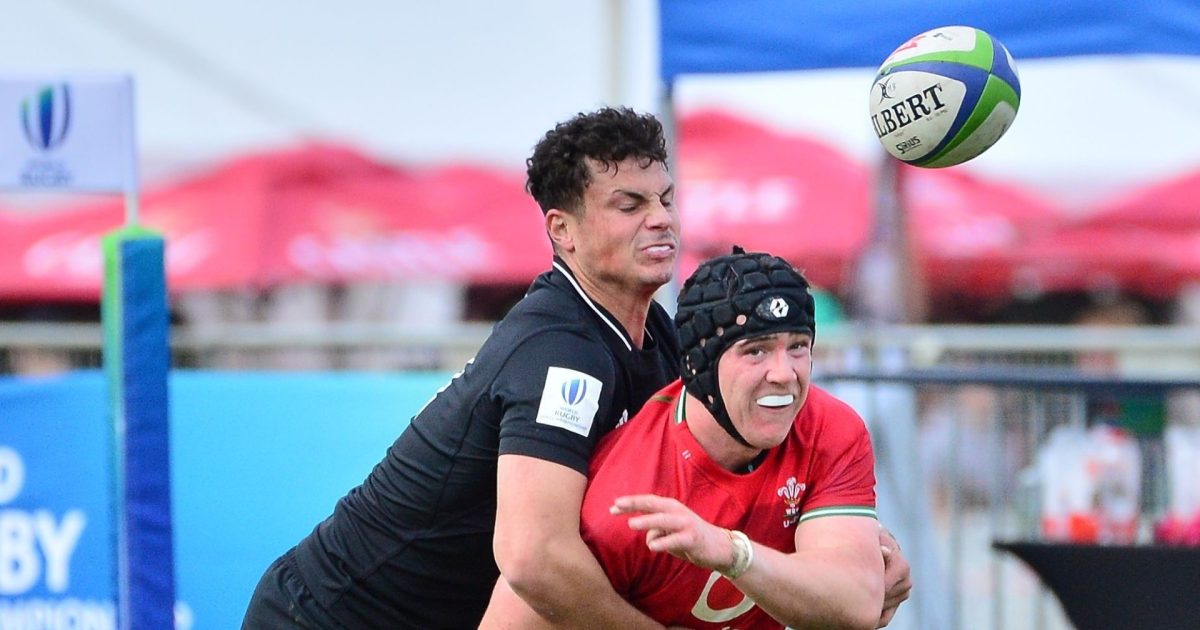The backstory of how Mark Jones' Wales nearly shocked New Zealand

It’s extraordinary what a bit of clear and effective re-organisation can quickly achieve. Just a few months ago Wales had been rendered winless in the Six Nations U20s, enduring 17- and 16-point home losses to Ireland and England as well as getting hammered on the road by a 50-point margin in France after tight affairs versus Scotland and Italy escaped them by one and four points.
The wooden spoon campaign resulted in Byron Hayward resigning as the lead pathway coach and into the breach on May 11 as an interim head coach came Mark Jones, the ex-Test winger whose return to Worcester after successfully assisting at the Super Rugby Crusaders came a cropper when the Warriors fell into administration last September.
Forty-five days on from his appointment, Jones remarkably got the misfiring Wales to within a whisker of ambushing New Zealand. A 19-5 interval lead in Paarl on Saturday had rekindled memories of the famed 9-6 surprise that had taken place just down the road in Stellenbosch 11 years ago, the Welsh class of 2012 spectacularly ending New Zealand’s 21-match unbeaten run in the tournament.
However, whereas Wales were able to withstand a Baby Blacks onslaught in the deluge that fell at the Danie Craven Stadium all those years ago, the dry conditions in Paarl allowed New Zealand to move the ball when it mattered, and they eventually clinched a 27-26 comeback win. There were plenty of plaudits due Jones’ way for the defiant way Wales had played but he was having none of it in the aftermath.
“I haven’t done anything,” he insisted to RugbyPass about his few short weeks with the Wales squad. “What I have done is align the group, given the guys a clear purpose and a training plan that replicates what we are trying to produce – and the players are putting the effort in and have brought it alive.
“It’s like a diet: unless you adhere to it, it is not going to do you any good. I have got to give all credit to the staff and the players. I also have got to send a message that we shouldn’t be happy that we have lost by a point. We should be disappointed, but we have to use it as fuel for our next games.”
That will happen on Thursday when they take on Japan in Stellenbosch, and Jones will be looking to see more of what inspiringly unfolded against New Zealand. Asked what he said to his team at the interval in Paarl after they had secured a deserved 14-point lead, he said: “My message was to stick to the plan.
“We came up with a pretty clear game plan and other than the first seven or eight minutes of the first half, we nailed it and it was working effectively for us and the scoreboard reflected that. We talked about a few areas of improvement second half. We felt that we could get more line speed off our set-piece, we were missing the jump a little bit off their lineout.
“But really we spoke just about continuing what we were doing well: let’s be really dominant at the maul, let’s get field position through it and then let’s use our backs when we shorten up the defensive line. To be fair to the All Blacks, they challenged us physically around our defensive game.
“We gave a few soft penalties away, we didn’t get a restart right from conceding a try and we conceded two quick back-to-back tries which shifted the scoreboard but also shifted the momentum and by the time the boys had worked out how to get momentum back, it was a little bit late. Proud of the way the guys responded and adapted. We have taken two points from the game, and we can also take a lot of positives.”
The biggest encouragement was how Wales stayed in the fight even though New Zealand threatened like they could run away with it having moved 27-19 ahead. “The last 20 minutes of the game was a real focus for us based on the Six Nations,” explained Jones. “It’s an area that dropped off tactically and physically for us.
“We put a lot of time into that and ironically we looked stronger at the end of each half. That is a real improvement, and these players will get a lot of confidence from that when we go in to play our future games, that we can go for the full 80. The key learning for us is tactically getting the big moments right, especially when the scoreboard is in the balance.
“The whole team stood out,” he added. “I thought the front five were tremendous around the maul and setting the maul. I thought our half-backs were excellent at pulling the trigger when the opportunities were on to take points with the boot or through handling. And I thought defensively our back row was tenacious and fought for everything, so there was a real full house of a team performance.
“But we have to park this performance now. There is a lot of learnings to take out from it both positive and work-ons, but it should give the whole squad optimism around our next game. The challenge is, can we repeat it? There is the challenge for the group, can we do it back-to-back?”









































































